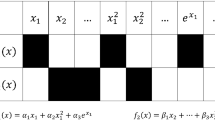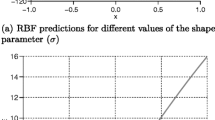Abstract
Surrogate-based optimization proceeds in cycles. Each cycle consists of analyzing a number of designs, fitting a surrogate, performing optimization based on the surrogate, and finally analyzing a candidate solution. Algorithms that use the surrogate uncertainty estimator to guide the selection of the next sampling candidate are readily available, e.g., the efficient global optimization (EGO) algorithm. However, adding one single point at a time may not be efficient when the main concern is wall-clock time (rather than number of simulations) and simulations can run in parallel. Also, the need for uncertainty estimates limits EGO-like strategies to surrogates normally implemented with such estimates (e.g., kriging and polynomial response surface). We propose the multiple surrogate efficient global optimization (MSEGO) algorithm, which adds several points per optimization cycle with the help of multiple surrogates. We import uncertainty estimates from one surrogate to another to allow use of surrogates that do not provide them. The approach is tested on three analytic examples for nine basic surrogates including kriging, radial basis neural networks, linear Shepard, and six different instances of support vector regression. We found that MSEGO works well even with imported uncertainty estimates, delivering better results in a fraction of the optimization cycles needed by EGO.
Similar content being viewed by others
References
Wang L., Shan S., Wang G.G.: Mode-pursuing sampling method for global optimization on expensive black-box functions. Eng. Optim. 36(4), 419–438 (2004)
Kleijnen J.P.C., Sanchez S.M., Lucas T.W., Cioppa T.M.: A user’s guide to the brave new world of designing simulation experiments. INFORMS J. Comput. 17(3), 263–289 (2005)
Sóbester A., Leary S., Keane A.: On the design of optimization strategies based on global response surface approximation models. J. Glob. Optim. 33(1), 31–59 (2005)
Simpson, T.W., Toropov, V., Balabanov, V., Viana, F.A.C.: Design and analysis of computer experiments in multidisciplinary design optimization: a review of how far we have come—or not. In: 12th AIAA/ISSMO Multidisciplinary Analysis and Optimization Conference, AIAA–2008–5802. AIAA, Victoria, BC, Canada (2008)
Forrester A.I.J., Keane A.J.: Recent advances in surrogate-based optimization. Prog. Aerosp. Sci. 45(1–3), 50–79 (2009)
Viana, F.A.C., Gogu, C., Haftka, R.T.: Making the most out of surrogate models: tricks of the trade. In: ASME 2010 International Design Engineering Technical Conferences & Computers and Information in Engineering Conference, DETC2010–28813, ASME, Montreal, QC, Canada (2009)
Jones D.R., Schonlau M., Welch W.J.: Efficient global optimization of expensive black-box functions. J. Glob. Optim. 13(4), 455–492 (1998)
Jin, R., Chen, W., Sudjianto, A.: On sequential sampling for global metamodeling for in engineering design. In: ASME 2002 International Design Engineering Technical Conferences & Computers and Information in Engineering Conference, DETC2002–34092. ASME, Montreal, QC, Canada (2002)
Huang D., Allen T., Notz W., Zeng N.: Global optimization of stochastic black-box systems via sequential kriging meta-models. J. Glob. Optim. 34(3), 441–466 (2006)
Henkenjohann N., Kunert J.: An efficient sequential optimization approach based on the multivariate expected improvement criterion. Qual. Eng. 19(4), 267–280 (2007)
Ponweiser, W., Wagner, T., Vincze, M.: Clustered multiple generalized expected improvement: a novel infill sampling criterion for surrogate models. In: IEEE Congress on Evolutionary Computation, pp. 3514–3521. IEEE, Hong Kong (2008)
Jones D.R.: A taxonomy of global optimization methods based on response surfaces. J. Glob. Optim. 21(4), 345–383 (2001)
Ginsbourger D., Le Riche R., Carraro L.: Kriging is well-suited to parallelize optimization. In: Tenne, Y., Goh, C. (eds) Computational Intelligence in Expensive Optimization Problems, vol. 2, pp. 131–162. Springer, Heidelberg (2010)
Samad A., Kim K.Y., Goel T., Haftka R.T., Shyy W.: Multiple surrogate modeling for axial compressor blade shape optimization. J. Propuls. Power 24(2), 302–310 (2008)
Viana, F.A.C., Haftka, R.T.: Using multiple surrogates for metamodeling. In: 7th ASMO-UK ISSMO International Conference on Engineering Design Optimization, pp. 1–18. ISSMO, Bath, UK (2008)
Gorissen D., Dhaene T., de Turck F.: Evolutionary model type selection for global surrogate modeling. J. Mach. Learn. Res. 10(1), 2039–2078 (2009)
Cho Y.C., Jayaraman B., Viana F.A.C., Haftka R.T., Shyy W.: Surrogate modeling for characterizing the performance of dielectric barrier discharge plasma actuator. Int. J. Comput. Fluid Dyn. 24(7), 281–301 (2010)
Gutmann H.M.: A radial basis function method for global optimization. J. Glob. Optim. 19(3), 201–227 (2001)
Stein M.L.: Interpolation of Spatial Data: Some Theory for Kriging. Springer, Berlin (1999)
Martin J.D., Simpson T.W.: Use of kriging models to approximate deterministic computer models. AIAA J. 43(4), 853–863 (2005)
Yamamoto J.K.: An alternative measure of the reliability of ordinary kriging estimates. Math. Geol. 32(4), 489–509 (2000)
den Hertog D., Kleijnen J.P.C., Siem A.Y.D.: The correct kriging variance estimated by bootstrapping. J. Oper. Res. Soc. 57(4), 400–409 (2006)
Kleijnen, J.P.C., van Beers, W.C.M., van Nieuwenhuyse, I.: Expected improvement in efficient global optimization through bootstrapped kriging. J. Glob. Optim. (available online), pp. 1–15 (2011)
Forrester A.I.J., Sóbester A., Keane A.J.: Engineering Design Via Surrogate Modelling: A Practical Guide. Wiley, New York (2008)
Forrester A.I.J., Sóbester A., Keane A.J.: Multi-fidelity optimization via surrogate modeling. Proc. R. Soc. A Math. Phys. Eng. Sci. 463(2088), 3251–3269 (2007)
Fang H., Horstemeyer M.F.: Global response approximation with radial basis functions. Eng. Optim. 38(4), 407–424 (2006)
Goel T., Stander N.: Comparing three error criteria for selecting radial basis function network topology. Comput. Methods Appl. Mech. Eng. 198(27–29), 2137–2150 (2009)
Berry M.W., Minser K.S.: Algorithm 798: high-dimensional interpolation using the modified Shepard method. ACM Trans. Math. Softw. 25(3), 353–366 (1999)
Thacker W.I., Zhang J., Watson L.T., Birch J.B., Iyer M.A., Berry M.W.: Algorithm 905: Sheppack: modified Shepard algorithm for interpolation of scattered multivariate data. ACM Trans. Math. Softw. 37(3), 1–20 (2010)
Cristianini N., Shawe-Taylor J.: An Introduction to Support Vector Machines and Other Kernel-Based Learning Methods. Cambridge University Press, Cambridge (2000)
Smola A.J., Schölkopf B.: A tutorial on support vector regression. Stat. Comput. 14(3), 199–222 (2004)
Viana, F.A.C., Haftka, R.T.: Importing uncertainty estimates from one surrogate to another. In: 50th AIAA/ASME/ASCE/AHS/ASC Structures, Structural Dynamics, and Materials Conference, pp. AIAA–2009–2237. AIAA, Palm Springs, CA, USA (2009)
Viana F.A.C., Haftka R.T., Steffen V. Jr: Multiple surrogates: how cross-validation errors can help us to obtain the best predictor. Struct. Multidiscip. Optim. 39(4), 439–457 (2009)
Lophaven, S.N., Nielsen, H.B., Søndergaard, J.: Dace—a matlab kriging toolbox. Tech. Rep. IMM–TR–2002–12, Technical University of Denmark, Denmark (2002). Available at http://www2.imm.dtu.dk/~hbn/dace/
MathWorks contributors: MATLAB The language of technical computing. The MathWorks, Inc, Natick, MA, USA, version 7.0 release 14 edn. (2004)
Jekabsons, G.: RBF: Radial Basis Function interpolation for MATLAB/OCTAVE. Riga Technical University, Latvia, version 1.1 edn. (2009). Available at http://www.cs.rtu.lv/jekabsons/regression.html
Viana, F.A.C.: SURROGATES Toolbox User’s Guide. Gainesville, FL, USA, version 3.0 edn. (2011). Available at http://sites.google.com/site/felipeacviana/surrogatestoolbox
Gunn, S.R.: Support vector machines for classification and regression. Tech. rep., University of Southampton, UK (1997). Available at http://www.isis.ecs.soton.ac.uk/resources/svminfo/
Roustant, O. Ginsbourger, D., Deville, Y.: DiceKriging, DiceOptim: two R packages for the analysis of computer experiments by kriging-based metamodeling and optimization. Ecole Nationale Supérieure des Mines de Saint-Etienne, France and University of Bern, Switzerland (2010). Available at http://hal.archives-ouvertes.fr/hal-00495766/
Cherkassky V., Ma Y.: Practical selection of svm parameters and noise estimation for svm regression. Neural Netw. 17(1), 113–126 (2004)
Sasena, M.J.: Optimization of computer simulations via smoothing splines and kriging metamodels. Master’s thesis, University of Michigan, Ann Arbor, MI, USA (1998)
Dixon, L.C.W., Szegö, G.P.: Towards Global Optimization 2. North Holland, Amsterdam (1978)
McKay M.D., Beckman R.J., Conover W.J.: A comparison of three methods for selecting values of input variables from a computer code. Technometrics 21(2), 239–245 (1979)
Price K.V., Storn R.M., Lampinen J.A.: Differential Evolution: A Practical Approach to Global Optimization. Springer, New York (2005)
Storn R., Price K.: Differential evolution—a simple and efficient heuristic for global optimization over continuous spaces. J. Glob. Optim. 11(4), 341–359 (1997)
Schutte J.F., Haftka R.T., Fregly B.J.: Improved global convergence probability using multiple independent optimizations. Int. J. Numer. Methods Eng. 71(6), 678–702 (2007)
Viana F.A.C., Haftka R.T.: Cross validation can estimate how well prediction variance correlates with error. AIAA J. 47(9), 2266–2270 (2009)
Meckesheimer M., Booker A.J., Barton R.R., Simpson T.W.: Computationally inexpensive metamodel assessment strategies. AIAA J. 40(10), 2053–2060 (2002)
Picard R.R., Cook R.D.: Cross-validation of regression models. J. Am. Stat. Assoc. 79(387), 575–583 (1984)
Varma S., Simon R.: Bias in error estimation when using cross-validation for model selection. BMC Bioinf. 7(91), 1290–1300 (2006)
Myers R.H.: Classical and Modern Regression with Applications. Duxbury Press, Belmont (2000)
Author information
Authors and Affiliations
Corresponding author
Rights and permissions
About this article
Cite this article
Viana, F.A.C., Haftka, R.T. & Watson, L.T. Efficient global optimization algorithm assisted by multiple surrogate techniques. J Glob Optim 56, 669–689 (2013). https://doi.org/10.1007/s10898-012-9892-5
Received:
Accepted:
Published:
Issue Date:
DOI: https://doi.org/10.1007/s10898-012-9892-5




